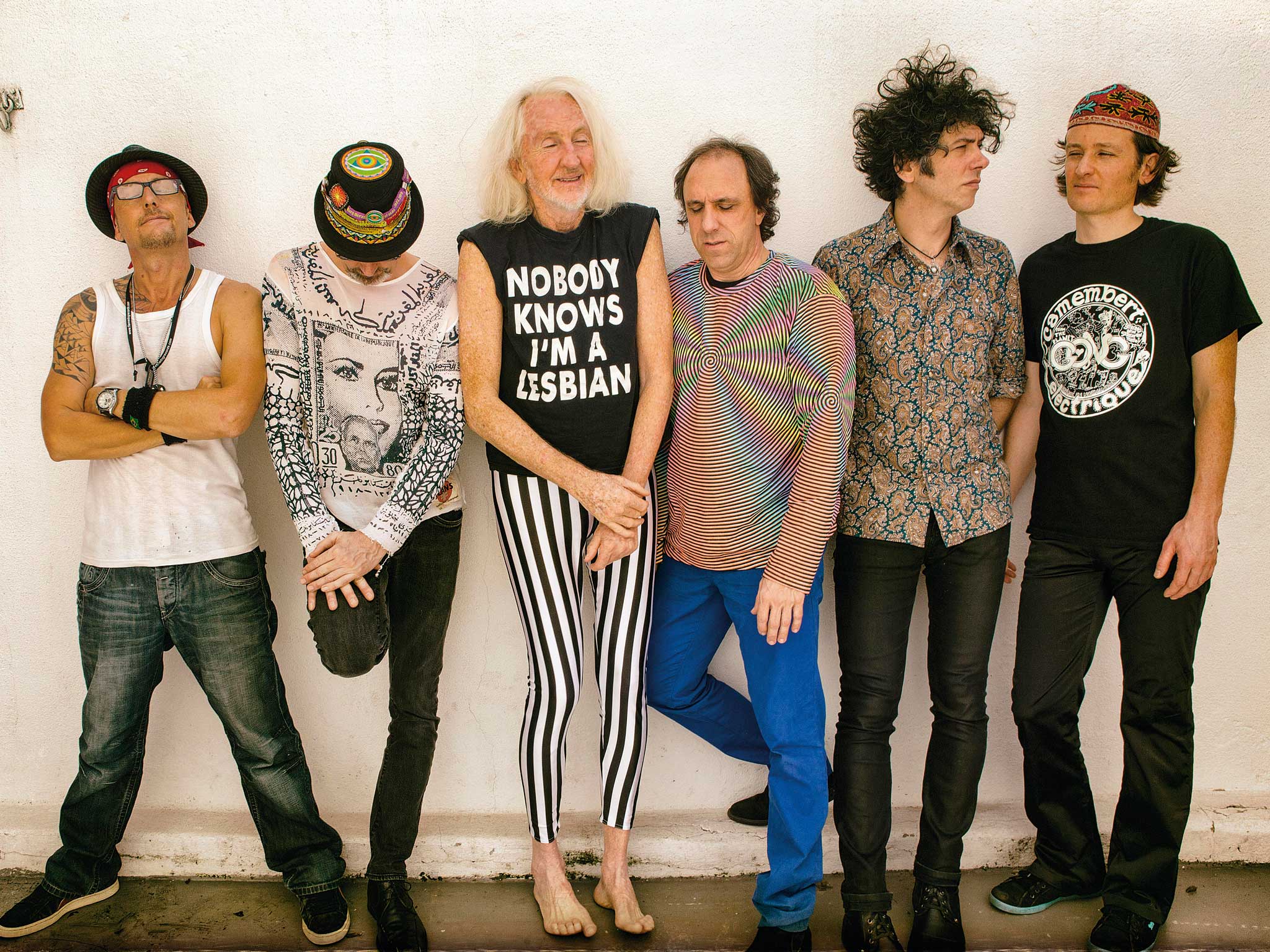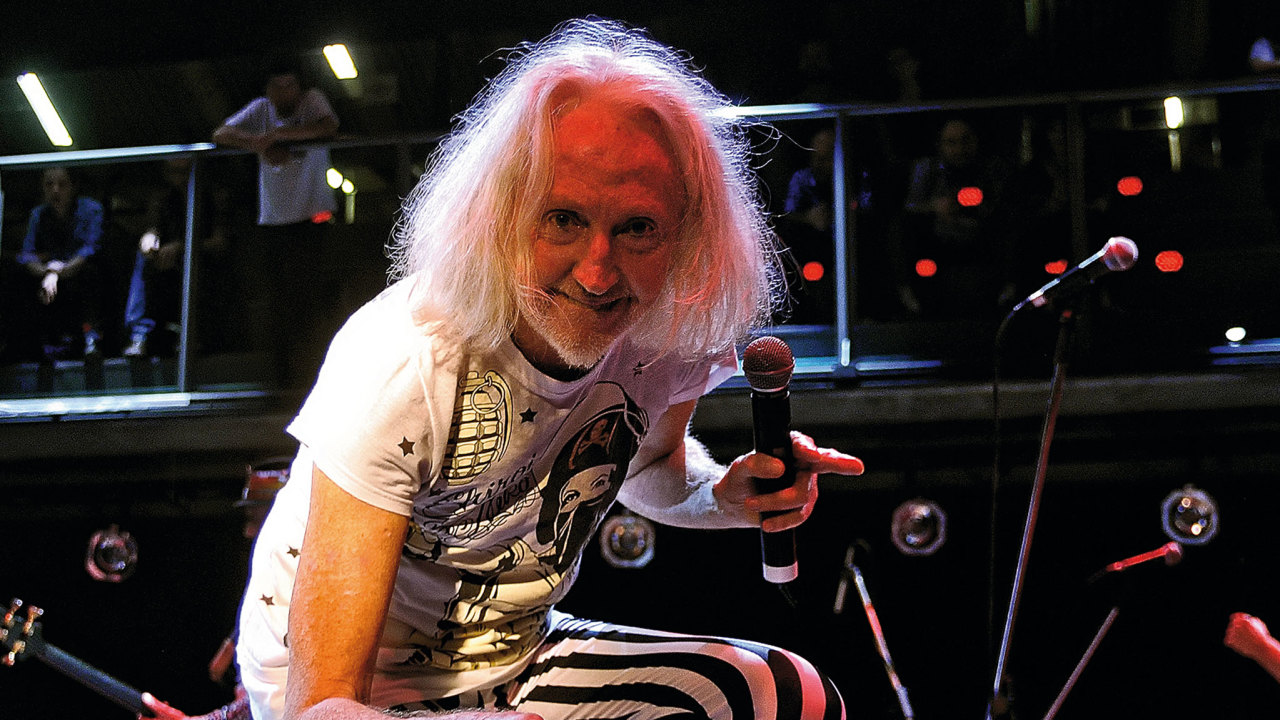"Hopefully the cancer will recede to give me a few more years of creativity, but at 76, I can accept that my days are numbered,” observes Daevid Allen without any hint of drama or mawkishness regarding the discovery of a cancerous tumour in his neck.
Following treatment, Allen is on the mend, having received an almost tangible current of good vibes from fans around the world since his illness was announced in June 2014. Though profoundly grateful, he remains philosophical. “There are so many people now suffering from cancer that it is never far from any of us and I wish them all well. As for me, I am coping… just.” Talk to anyone who knows Allen or has played with him in one of the numerous variants of Gong and the same words and phrases keep getting used: charismatic, energetic, sharp, bright, instinctive, funny, free spirit, timeless, intense, incredibly musical and unafraid to speak his mind. Ask anyone who has seen Gong at any point over nearly six decades and they’ll point to Allen’s performance, which still has more sparkle and stamina than most artists half his age. Ever since arriving in Canterbury in the early 1960s from his native Australia, Allen had a habit of being interested in what other people could do and then whipping up a creative force that would make things happen. That included musicians like Robert Wyatt, Kevin Ayers and Mike Ratledge, who gathered around him to form Soft Machine. When denied re-entry into the UK following their European tour in 1967, undaunted, Allen remained in France, ducking and diving between pop festivals, student unrest and confrontations with the police, accruing a ragtag, shifting ensemble that would eventually coalesce into Gong. From being an obscure foreign import to a regular fixture on the polytechnic and municipal hall circuit, Gong added their own idiosyncratic, dazzling splash of psychedelic colour to the monochrome mid-70s United Kingdom as they toured albums such as Flying Teapot, Angel’s Egg (both 1973), You (1974) and 1971’s Camembert Electrique (reissued in 1974). Time will tell as to whether 2014’s I See You will be regarded in the same reverential tones as those illustrious predecessors, but listening to its punchy tracks, wry humour and biting analysis, it’s hard to avoid the conclusion that this is without doubt the strongest and arguably the most coherent Gong record in a long time. For a band often perceived as having their heads in the clouds, what’s striking about the new album is its desire to engage with the realpolitik here and now, at a time when no one else seems interested in discussing where society is heading. So why does Allen think there aren’t more artists and albums railing against exploitation and ideological excess in the way that Gong are today? “Social media soporifics such as taste tailoring and mindset feedback loops are possibly absorbing radicalism to some extent. In my own songwriting I try to strike a balance between political clarity and absurdist spiritual uplift. Art as a mirror versus art as transformer. What I see is a great deal of activity, both creative and destructive. Obviously change is all around us. I suppose it depends whether we want things to stay the same or whether we are conservative or adventurist. Personally, I find the future is always more exciting than the past.” But if the album sounds forward-looking and very much located in the present with tracks such as Occupy, When God Shakes Hands With The Devil, This Revolution and the title cut, it’s also flecked with samples and snippets of Gong’s musical past; little self-referential bubbles percolating up from the leaves in the musical teapot. “They come from my son, Orlando, who is taking my love of crazy collage to another level,” explains Allen. “He has a huge respect for early Gong history and all its aspects and he feels they should be referenced as flashbacks from the past, reflected in the present moment.” To what does Allen attribute Gong’s longevity and appeal? “Firstly I would say not letting it get too commercially successful. Virgin Records had a good hard go at it in the mid-70s but as with Soft Machine as it started to peak, the wrong people were being sucked in and it smelled suspicious to me. So, as always, I skedaddled it till it came back down to earth. “Secondly, because it has constantly changed its personnel, musical style, image and attitude, without losing that central current that made it still sound like Gong. Some attribute this mysterious current mistakenly to myself yet I feel it’s intellectual laziness to do so. Gong has rejoiced in a cast of musicians of extraordinary brilliance and diversity, from Pierre Moerlen to Tatsuya Yoshida, Steve Hillage to Kawabata Makoto, Bill Laswell to Francis Moze, Didier Malherbe to Theo Travis to Ian East – and I could go on and on.”

Though possessing little in the way of formal musical training, Allen’s antenna has always been finely attuned when it comes to picking up potential musical partners. The newest recruit to Gong, guitarist Kavus Torabi of Knifeworld and Guapo, remembers the moment Allen approached him to join the band. “He was in London in 2013 playing with Marshall Allen from Sun Ra. We had Daevid as a guest on the radio show I do with Steve Davis and out of the blue he asked if I would like to play guitar in Gong. I told him I’d love to but pointed out that he’d never heard me play. He said, ‘I don’t need to. I can tell you’re right. I was like this about Mike Howlett. I just know you’re going to be right.’ “I’d heard Gong in my mid-to-late teens, starting with Flying Teapot, and straight away I was hooked. For me, Gong starts with Camembert Electrique and goes up to You. Those are the four main Gong records for me. With that in mind, I told him that I couldn’t play like Steve Hillage. He said to me, ‘Kavus, I’m not interested in what you can’t do but in what you can do.’” Alongside Allen and Torabi, I See You features Dave Sturt (bass), Ian East (sax and flute), Fabio Golfetti (guitar) and Daevid’s son Orlando (drums). There are points on the album which sound utterly unlike Gong, yet at the same time it couldn’t really be anybody else, as on Shakti Yoni & Dingo Virgin, suffused with Allen’s eerily shifting trademark glissando guitar and Gilli Smyth’s echo-drenched space whispers. While Allen’s presence is of course significant, it’s nevertheless the work of a collective process, as bassist Dave Sturt points out. “The album comes from a mixture of jams, as well as swapping files remotely. It’s quite surprising how homogenous the whole thing is; a really good mix of formally composed and music made in the moment. That’s definitely one of its strengths, and I think that’s what Gong’s always been about. The members who are involved now have all melded together really well – a good mix of musicians and compositional ideas. “As a player, as the album comes together you focus on one track at a time, but Daevid is capable of holding the overview, knowing what the whole finished album is about and what he wants to present. “Since 2012 he has been very keen to say that the current band is a democracy, that we are all equal, but I think he’s more equal than others. Why? Well, because he’s been there since there were riots happening in Paris in 1968, when Gong came together. He’s got the overarching vision as to what it’s all about, but he needs other people to feed off.” While Allen’s illness meant the cancellation of a tour that would have included Glastonbury and other high-profile events, the band will be playing live dates – albeit without its founder. “We’re honouring the album and his music,” Sturt says. “We’ll be playing some old songs and some of the new songs from I See You in the spirit of Gong. The hope is that Daevid will recover enough to be able to play again with us, but there are no concrete plans at the moment. We just want him to get well.” When asked to choose the Gong record where Allen feels he got closest to realising what he wanted to achieve, he replies, “This one, of course! For me this album is also a grateful farewell, as you can tell from Thank You.” He’s referring to a lyric that states ‘Thank you for the music, thank you for your cheers, thank you ’cos you’re here now.’ “This current album and line-up makes me very proud. My greatest wish is that Gong can become a musical tradition and continue to give pleasure, excitement and positive uplift for a long time after I am gone.” I See You is out now via Madfish. For more information, see www.gongband.info.

